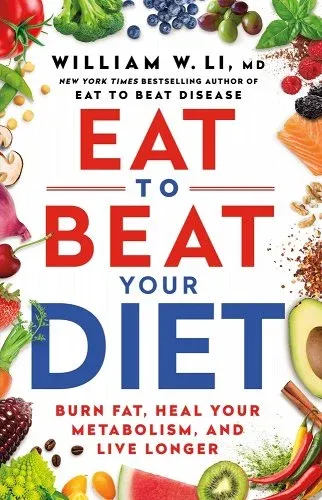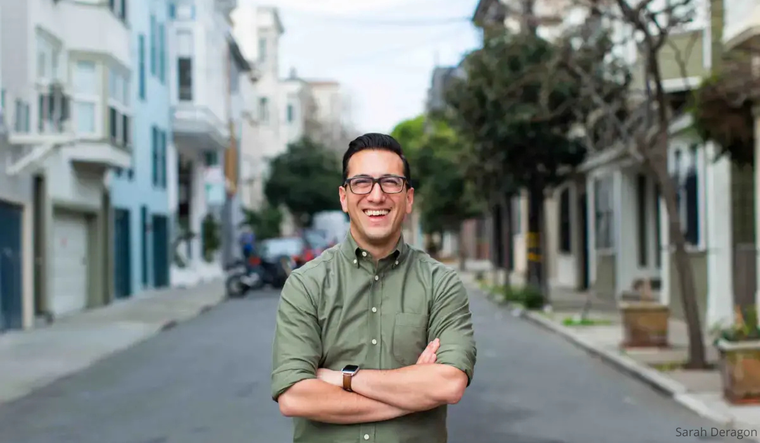Legendary Doctor William Li is Known for Helping Us Eat to Beat Disease. He Says All of Us Are Hardwired for Health—and It Starts With Our Forks
With so much (often contradictory!) diet advice, it can be tough to know what to eat.
Does coffee prevent or cause disease? Are eggs a healthy source of protein or do they raise cholesterol? From meat to MSG, soy to sourdough bread, the list of foods scientists can’t seem to agree on is seemingly endless.
Enter William Li, MD, author of the New York Times bestseller, Eat to Beat Disease and most recently, Eat to Beat Your Diet. One of the reasons Dr. Li’s books resonate with so many of us is because he rises above these proverbial food fights and explains the science-backed facts: Our bodies are hardwired for health and capable of healing themselves, and the foods we eat can amplify this power.
If that sounds great—but you’re still not sure what, exactly, to eat and how to prepare health-boosting meals, Dr. Li’s newest book is the answer. Remember when you were a little kid and sat in the shopping cart as a parent pushed you around? Well, imagine you’re a kid again—but the person pushing the cart is Dr. Li.
“In Eat to Beat Your Diet, I take you shopping with me,” says Dr. Li. “The fact is you can find something healthy in every section of the store. You don’t have to shop online for ‘superfoods’ marketed by influencers to eat foods that can transform your health.”
The Sunday Paper sat down with Dr. Li to ask him about some of these health-boosting foods, as well as what’s surprised him most in his many years of research and how all of us can harness the power of our diets to live better, longer.
A CONVERSATION WITH DR. WILLIAM LI
Your books explain how and why the foods we eat can boost our defense systems so the body can heal itself. You write that we are “hardwired for health.” Can you explain this?
Think back to the last time you bought a new laptop and took it out of the box. You plugged it in, booted it up, and the operating system worked perfectly.
We all start out life this way. We come out of the womb, hardwired for health. Yet just like over the course of the life of a laptop things can happen to it—it starts to slow down, or we spill coffee on it and it needs to be fixed—the same happens to our bodies. What I’ve done with my new research and book is take a look at what we all can do to allow our operating systems—the hardwiring in our bodies we’re all born with—to continue to work optimally for as long as possible.
In my first book, I write about the five health defense systems. In my 30-year career developing biotech solutions for disease, I’ve looked at how to treat those health defense systems when they’re damaged. In my new book, I’m looking at the other side of the coin: How do we heal those defense systems, without having to wait for expensive drugs to be approved? What I’ve realized is that if we want to address the needs of a society that’s being crushed by a healthcare system that doesn’t deal enough with prevention, we must focus on food as medicine.
However, Eat to Beat Your Diet isn’t a diet book—in fact, I think it’s an anti-diet book. What I most want readers to understand when they read this book is that you can eat foods you enjoy that also come from Mother Nature’s pharmacy, and those foods can ignite your health and your taste buds.
What has surprised you most as you’ve studied food as medicine? Anything that truly shocked you about the benefits of certain foods?
I used to be skeptical about the health claims of organic foods. For years, it rankled me that by paying more, there’d be less pesticide. Why would I pay more money for less bad stuff? But I’m now eating my words: New research shows many of the bioactives present in fruits and vegetables are actually made by edible plants as a response to being nibbled on by insects and pests. When little insects start nibbling on the plants, the plants respond by naturally making these bioactives. You can think of it like their own defense system, almost like a wound healing response. When you spray plants with pesticides, you don’t have as many pests—and plants don’t make as many bioactives. Research shows organic foods that have more pests have to do what the plants were hardwired to do: make more bioactives. So, when you buy organic, you’ll get foods more highly loaded with the bioactives that have been shown to improve your health.
Another thing that opened my eyes as I wrote Eat to Beat Your Diet: Like many people, I had misconceptions about metabolism. I used to believe you’re born with a fast or slow metabolism; that’s why someone skinny is “lucky” and can eat anything they want and never gain weight. I also used to believe that when you hit middle age, your shape inevitably changes, your metabolism slows, and you enter the battle with the muffin top. However, a jaw-dropping surprise for me was a discovery made in 2021. The world’s largest human metabolism study ever conducted—6,000 people ages 1-week old to their 90s in 20 countries—found that all of us are born with the same metabolism. Also, it turns out that when you hit middle age (between ages 20 and 60), human metabolism is actually designed to be rock stable. However, if you have excess fat, it slows down your operating system, so to speak. So, it’s not a slow metabolism that causes you to gain weight. It’s the other way around: Excess body fat slows your metabolism.
Wow, right? If our metabolism is not our genetic fate, and if excess body fat is the reason many of us have difficulties with metabolism and weight gain—and as a result, chronic disease—the power is back in our hands.
In your new book, you write about eating a “MediterAsian” diet. What is this? And why do you recommend eating this way?
I did a gap year before med school and traveled to Italy and Greece to try to better understand the connection between food, culture, and health. This was the 80s. What I noticed is that both in the Mediterranean and in Asia, they have absolutely delicious recipes. And that’s important, because these cultures have figured out how to use ingredients that are beneficial for health and how to prepare them in ways that delight the taste buds.
These days, we’re using cutting-edge science to understand why these combinations of foods are so good for us. Why would you want to sauté garlic in extra virgin olive oil and combine it with tomatoes and oregano? We now know how beneficial these combinations are—something our ancestors in these regions may not have understood but put together for generations because they tasted so good.
People in these cultures shopped locally, ate seasonally, and what they couldn’t get fresh was often dry or fermented. And guess what? These are the eating patterns everyone is recommending now.
What we’re hearing today is ancient wisdom, and now science is shining a light on what our grandmothers knew.
Out of all the incredible, science-backed information you provide in your books, what’s the best starting spot for the majority of us?
It’s very simple: Walk around the grocery store, spot the foods you enjoy, and write them down. Start in the fresh section. Do you like tomatoes, carrots, apples? You’ll find something you like. Once you’ve got your list, do a Google search: Type in the food you enjoy and “Mediterranean” or “Asian” recipe. Then, watch a video on how to make that recipe. Odds are you’ll see how easy it is to make something that’ll make your mouth water.
My mission is to get information out there that people can use. In my books, you’ll find lists and tables of foods and their doses. Take out a highlighter and highlight every food I mention that you enjoy. Put those on your shopping list and start there. Eating foods you like that also happen to be healthy is the best place to start.

Dr. William Li is a world-renowned physician, scientist, and New York Times bestselling author, best known for his role as President and Medical Director of the Angiogenesis Foundation. His work has led to more than 40 FDA-approved therapeutics and devices for cancer, cardiovascular disease, wound healing, and vision loss.
Question from the Editor: After reading this article, do you feel inspired to make any changes to the foods you’re eating? If so, let us know what those are!
Please note that we may receive affiliate commissions from the sales of linked products.



